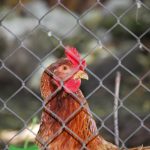Chickens possess a natural foraging instinct, and grass seed is particularly attractive to them due to its high protein content and other nutrients. The act of pecking at the ground and searching for seeds is an innate behavior for chickens, making grass seed an appealing food source. The texture and taste of grass seed further contribute to its allure for chickens.
Scratching the ground is another natural behavior for chickens, which can expose grass seeds and make them more accessible. This activity serves as both a foraging method and a form of stimulation, contributing to the chickens’ overall well-being. The attraction to grass seed is therefore not solely based on nutritional value but also on the chickens’ instinctual behaviors.
Chickens are opportunistic feeders, meaning they will consume any available food source, even if they have access to a balanced diet. This characteristic further explains their tendency to seek out grass seed when it is within reach. Understanding these natural behaviors and instincts is essential for developing effective strategies to prevent chickens from accessing grass seed.
Table of Contents
- 1 Creating barriers: How to prevent chickens from accessing grass seed
- 2 Distracting the chickens: Providing alternative sources of entertainment
- 3 Utilizing natural deterrents: Using plants and scents to repel chickens
- 4 Training and supervision: Teaching chickens to stay away from grass seed
- 5 Implementing physical deterrents: Installing fencing and covers to protect grass seed
- 6 Seeking professional advice: Consulting with poultry experts for additional solutions
- 7 FAQs
- 7.1 What are some natural ways to keep chickens away from grass seed?
- 7.2 Why is it important to keep chickens away from grass seed?
- 7.3 How can I protect grass seed from chickens without using chemicals?
- 7.4 Are there any plants that can help keep chickens away from grass seed?
- 7.5 What are some non-toxic repellents that can keep chickens away from grass seed?
Key Takeaways
- Chickens love grass seed because it is a natural and nutritious food source for them
- To prevent chickens from accessing grass seed, create barriers such as fencing and covers
- Provide alternative sources of entertainment to distract chickens from the grass seed
- Use natural deterrents such as plants and scents to repel chickens from the grass seed
- Train and supervise chickens to stay away from the grass seed, and seek professional advice from poultry experts for additional solutions
Creating barriers: How to prevent chickens from accessing grass seed
Physical Barriers: A Effective Solution
One effective way to prevent chickens from accessing grass seed is by creating physical barriers. This can be done by installing fencing around the area where the grass seed is planted or stored. The fencing should be tall enough to prevent the chickens from jumping over it and strong enough to withstand their attempts to break through.
Additional Measures for Maximum Protection
Additionally, burying the bottom of the fence underground can prevent the chickens from digging underneath it. Another option is to use covers or netting to protect the grass seed. This can be especially useful for areas where grass seed is planted in rows or patches. The covers should be securely fastened to the ground to prevent the chickens from lifting or moving them.
Maintaining the Barriers and Providing a Stimulating Environment
It’s important to regularly inspect the covers for any damage or wear and tear, as chickens can be persistent in their attempts to access the grass seed. In addition to physical barriers, it’s important to consider the layout of the chicken coop and run. Ensuring that the chickens have access to plenty of space, enrichment activities, and a balanced diet can help reduce their interest in seeking out grass seed.
Distracting the chickens: Providing alternative sources of entertainment
One way to prevent chickens from accessing grass seed is by providing them with alternative sources of entertainment. Chickens are naturally curious and active animals, so keeping them engaged with stimulating activities can help redirect their attention away from the grass seed. One option is to provide them with hanging treats or toys that they can peck at and play with.
This can include items such as hanging cabbage or lettuce, which not only provide entertainment but also offer nutritional benefits. Another way to distract chickens is by creating a designated foraging area within their enclosure. This can be done by scattering scratch grains or other treats in a specific area for the chickens to search for.
By providing them with a designated foraging space, they are less likely to seek out grass seed in other areas. Additionally, introducing new elements to their environment can help keep chickens entertained and engaged. This can include adding perches, dust bathing areas, or even introducing new objects for them to explore.
By keeping their environment dynamic and stimulating, chickens are less likely to focus on seeking out grass seed. It’s important to regularly rotate and refresh the enrichment activities in the chicken coop and run to prevent boredom and keep the chickens engaged. By providing them with plenty of entertainment and stimulation, they are less likely to be motivated to seek out grass seed.
Utilizing natural deterrents: Using plants and scents to repel chickens
Another approach to preventing chickens from accessing grass seed is by utilizing natural deterrents. Certain plants and scents are known to repel chickens and can be strategically planted around areas where grass seed is planted or stored. For example, planting strong-smelling herbs such as lavender, mint, or rosemary can help deter chickens from venturing into those areas.
Additionally, certain plants such as marigolds are known to repel insects, which can indirectly help protect the grass seed from being eaten by pests that attract chickens. By strategically planting these types of plants around the perimeter of the grass seed area, it can help create a natural barrier that deters chickens from accessing it. Another natural deterrent is the use of citrus peels or essential oils.
Chickens are known to dislike the smell of citrus, so placing citrus peels or using citrus-scented essential oils around the perimeter of the grass seed area can help deter them from approaching. It’s important to regularly refresh these natural deterrents as their effectiveness may diminish over time. In addition to plants and scents, there are also commercial products available that utilize natural ingredients such as garlic or hot pepper to repel chickens.
These products can be applied around the perimeter of the grass seed area and serve as an additional layer of defense against chicken intrusion.
Training and supervision: Teaching chickens to stay away from grass seed
Training and supervision are important aspects of preventing chickens from accessing grass seed. Chickens are intelligent animals and can be taught through positive reinforcement to avoid certain areas or behaviors. One approach is to use treats as a form of positive reinforcement when the chickens avoid the grass seed area.
By rewarding them with treats when they stay away from the grass seed, they learn that avoiding that area results in a positive outcome. Consistency is key when training chickens, so it’s important to reinforce this behavior regularly. Additionally, providing verbal cues such as “no” or “stay away” when they approach the grass seed area can help reinforce the message that they should not go near it.
Supervision is also important in ensuring that the training is effective. Regularly monitoring the chickens’ behavior around the grass seed area allows for immediate correction if they attempt to access it. By consistently reinforcing the message that they should stay away from the grass seed, chickens can learn over time to avoid that area.
It’s important to note that training and supervision require patience and consistency. It may take time for chickens to learn and adapt their behavior, so it’s important to remain persistent in reinforcing the message that they should stay away from the grass seed.
Implementing physical deterrents: Installing fencing and covers to protect grass seed

In addition to creating barriers, implementing physical deterrents can further protect grass seed from being accessed by chickens. One effective method is installing chicken wire fencing around the perimeter of the grass seed area. Chicken wire fencing is specifically designed to keep chickens out and can be installed at varying heights depending on the size and breed of the chickens.
Another option is using cloches or protective covers over individual patches of grass seed. Cloches are transparent covers that can be placed over small areas of planted seeds to protect them from being accessed by chickens. These covers allow sunlight and water to reach the seeds while preventing chickens from reaching them.
For larger areas of grass seed, using netting or mesh covers can provide protection while still allowing airflow and sunlight to reach the seeds. These covers should be securely fastened to the ground to prevent any gaps that chickens could exploit. It’s important to regularly inspect these physical deterrents for any damage or wear and tear, as well as ensuring that they are properly secured in place.
By implementing these physical deterrents, it provides an additional layer of protection against chicken intrusion.
Seeking professional advice: Consulting with poultry experts for additional solutions
If all else fails, seeking professional advice from poultry experts can provide additional solutions for preventing chickens from accessing grass seed. Poultry experts have extensive knowledge and experience in dealing with chicken behavior and can offer valuable insights into effective deterrent methods. One option is consulting with a veterinarian who specializes in poultry care.
They can provide guidance on nutritional needs, behavioral management, and potential health issues that may be contributing to the chickens’ attraction to grass seed. Another option is reaching out to experienced poultry farmers or breeders who have dealt with similar challenges in protecting their crops from chicken intrusion. They may offer practical advice based on their own experiences and provide recommendations for effective deterrent methods.
Additionally, agricultural extension services or local farming organizations may offer workshops or resources specifically focused on poultry management and crop protection. These resources can provide valuable information on best practices for deterring chickens from accessing crops such as grass seed. By seeking professional advice, it allows for a more comprehensive approach in addressing the issue of preventing chickens from accessing grass seed.
Professionals can offer tailored solutions based on specific circumstances and provide ongoing support in implementing effective deterrent methods. In conclusion, preventing chickens from accessing grass seed requires a multi-faceted approach that takes into consideration their natural behaviors and instincts. Understanding why chickens are drawn to grass seed is crucial in developing effective solutions such as creating barriers, providing alternative sources of entertainment, utilizing natural deterrents, training and supervision, implementing physical deterrents, and seeking professional advice.
By addressing this issue proactively, it ensures that both the well-being of the chickens and the protection of valuable crops such as grass seed are prioritized.
If you’re struggling to keep chickens away from your grass seed, you may also be interested in learning about the benefits of using a heater for a chicken coop. Check out this article to find out how a heater can improve the comfort and well-being of your chickens during colder months.
FAQs
What are some natural ways to keep chickens away from grass seed?
Some natural ways to keep chickens away from grass seed include using physical barriers such as chicken wire or netting, planting deterrent plants like marigolds or lavender, and using natural repellents like citrus peels or vinegar.
Why is it important to keep chickens away from grass seed?
It is important to keep chickens away from grass seed because they can eat or scratch up the seeds, preventing them from germinating and growing into healthy grass. This can result in a patchy or uneven lawn.
How can I protect grass seed from chickens without using chemicals?
You can protect grass seed from chickens without using chemicals by using natural deterrents such as physical barriers, planting deterrent plants, and using natural repellents. These methods are effective at keeping chickens away without harming the environment.
Are there any plants that can help keep chickens away from grass seed?
Yes, there are plants that can help keep chickens away from grass seed. Plants like marigolds, lavender, and rosemary have strong scents that can deter chickens from pecking at the grass seed.
What are some non-toxic repellents that can keep chickens away from grass seed?
Non-toxic repellents that can keep chickens away from grass seed include citrus peels, vinegar, and garlic. These natural repellents have strong scents that chickens find unpleasant, deterring them from the grass seed.
Meet Walter, the feathered-friend fanatic of Florida! Nestled in the sunshine state, Walter struts through life with his feathered companions, clucking his way to happiness. With a coop that’s fancier than a five-star hotel, he’s the Don Juan of the chicken world. When he’s not teaching his hens to do the cha-cha, you’ll find him in a heated debate with his prized rooster, Sir Clucks-a-Lot. Walter’s poultry passion is no yolk; he’s the sunny-side-up guy you never knew you needed in your flock of friends!







